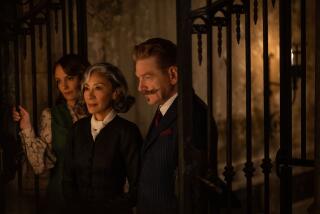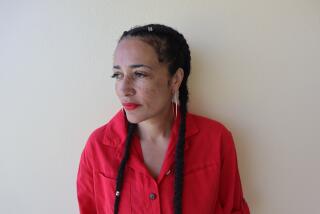Shadowing Dame Agatha
- Share via
TORQUAY, England — “The Murder of Roger Ackroyd” was my downfall. From then on I was an Agatha Christie fan. I joined the millions who were addicted to the First Lady of Detective Fiction.
It wasn’t just the crime-solving that kept us reading her huge output, or the endearing portrayals of her two master sleuths, Hercule Poirot and Jane Marple. Every time any of us started one of her stories, we took Monsieur Poirot’s advice to use our “little gray cells,” but every time, till the very end, only Agatha knew where the bodies were buried and why.
Last spring, when my husband, Ritchie, and I were planning a trip to England, we set aside a long weekend for the stretch of the South Devon coast known as “Agatha Christie Country.” There I would return to the scene of the crime writer, and Ritchie would fulfill the role of Capt. Arthur Hastings, assistant to the sleuth and baggage handler.
BritRail passes in hand (some of Agatha’s best mysteries took place on trains), we left London for the four-hour ride west to Devon.
“What Mrs. McGillicuddy Saw” from the window of the 4:50 from Paddington Station was a murder being committed on a parallel train. I saw nothing, but never mind. “Right train; wrong time,” Ritchie said.
We were headed for Torquay (pronounced tor-KEE), the upper-middle-class seaside resort on Tor Bay where the writer was born, and where, in 1990 on the centenary of her birth, an “Agatha Christie Mile” was marked for self-guided tours.
Although Ashfield, the house where she grew up, was no more, we found that other sites connected with Christie had changed little if at all.
The writer was christened Mary Clarissa Agatha Miller. Christie was the surname of her first husband (a cad if ever there was one). She may not have foreseen 79 crime novels, six other novels, four nonfiction books, 19 plays and more than 150 short stories, but she knew “Mary Miller” didn’t have the pizazz of “Agatha Christie.”
Torquay began developing as a posh resort in Queen Victoria’s day. The town remains uncompromisingly Victorian, from its seaside gardens, which are rather formal for a bathing resort, to the old-fashioned private changing tents on the beach of the Grand Hotel. The accents of those on holiday around us would have satisfied Professor Higgins. We didn’t encounter a single American, well-spoken or otherwise.
Outside Torquay proper, other Agatha-specific routes have been designated: Agatha Christie’s Riviera, the Coast and Countryside Trail, the Steam Train and Boat Trail. Alas, I had underestimated the time required for full investigation, but we were able to sample the high points.
Christie’s world was larger than this, of course. She had visited Egypt with her mother in lieu of making her society debut in London; she circled the globe with her first husband and lived in the Middle East when her second husband, archeologist Sir Max Mallowan, was on a dig. She traveled on the Orient Express and the Blue Train as well as the local line.
The Agatha Christie Mile begins at Beacon Cove, where, as a teenager, she nearly drowned, and proceeds to her father’s hangout, the Royal Torbay Yacht Club. Of greater interest is the next stop, the Imperial Hotel, which was the Majestic in “Peril at End House.” Ritchie and I had tea on the terrace where Miss Marple presented the solution to “Sleeping Murder,” her last case. Christie went to dances here, and the hotel’s Edwardian charm is intact.
The trail brochure told us Christie roller-skated on Princess Pier, shopped with her mother on the Strand, set part of “The A.B.C. urders” in the Princess Gardens and attended a concert in the Edwardian Pavilion the night Archie Christie proposed. Today the pavilion holds boutiques, upscale food shops and a bookstore well stocked with Christie mysteries.
Next to the harbor, Torre Abbey houses the art museum and a small memorial room that contains Christie’s favorite chair, 1937 Remington portable typewriter, rough notes and hand-corrected typescript of “A Caribbean Mystery.” On the grounds of the former monastery is a barn where 400 prisoners were held after the defeat of the Spanish Armada off the coast in 1588. The romantic young Christie must have loved it.
The Grand Hotel, at the end of the Torquay trail, is a monument to the frosted-plum-cake style of Victorian spas. Agatha and Archie Christie spent their wedding night here. It was Christmas Eve, 1914--wartime; she was a nurse’s aide, he an officer in the Royal Flying Corps. The Grand, elegant as ever, has named the honeymoon suite in their honor.
I wanted to stay at the Grand, or the equally gingerbready Imperial, but could not get reservations. We ended up in the Toorak Hotel, a cousin of “Fawlty Towers” on the old PBS-imported comedy series. Americans seemed incomprehensible to the staff. One day, for example, we were sitting on the terrace and asked the waiter for iced tea, a drink that’s no longer alien elsewhere in England. After an extraordinarily long time, the waiter returned, beaming, and handed us wine glasses filled with a pale liquid--watered-down tea at room temperature. The bill was for “two bar drinks.” It reminded us of an episode from the series, in which Basil Fawlty couldn’t bring himself to ask his American guests how to make the cocktails they ordered and so created a hilarious disaster.
Torquay still knows how to attract Christie’s kind of people. Young couples walk decorously hand-in-hand in the gardens. Elderly couples wearing traditional white bowl on the green. Dogs are well behaved, and roses and palms grow in tidy profusion.
The other two towns on “the Riviera,” so-called for its variety of Mediterranean vegetation, have different personalities. Paignton, by tradition more working class, attracts families with its swimming beach, boardwalk and old-fashioned amusement pier.
Brixham, smallest and oldest of the trio--it was settled in the Stone Age--is a fishing port.
The Christie-oriented Steam Train and Boat Trail started at Paignton. For about $16 each we rode in vintage railway cars to Kingswear, crossed the mouth of the River Dart by ferry, cruised up the river to Totnes and returned to Torquay by bus. The whole circuit covered about 20 miles and took almost three hours.
We wished we were driving a car, just to see Dartmoor, a national park of heaths, forests and villages that begins about 10 miles inland from Torquay. Christie was fond of Dartmoor. She retreated to the old Moorland Hotel there, in the village of Haytor, where she would not be distracted while finishing her first book, “The Mysterious Affair at Styles,” in 1920.
Christie spent the last 38 years of her life at Greenway, a white Georgian country house overlooking Dart. It is privately owned and barely visible from the water, but nevertheless the riverboat tour guide pointed it out, its eaves poking up above dense shrubbery.
Any number of English villages seen obliquely from the train could have been Miss Marple’s St. Mary Mead, and when Ritchie helped an elderly lady lift her suitcase on board at one stop, she used the very words of the ultimate amateur crime-solver: “So kind!” she said, heading into the standard-class car. Hercule Poirot, the professional detective, always rode first class, and with BritRail passes, so did we.
Though we touched the Christie-connected Coast and Countryside Trail in Dartmouth, we didn’t make it to nearby Salcombe, where Christie’s “Peril at End House,” the first Poirot movie, was filmed, or to Burgh Island, scene of “And Then There Were None”and “Evil Under the Sun.” We found out too late about Churston Ferrers, next to Brixham, where Agatha donated the stained glass window in the village church, and it would have been fun to dine at Churston Court Inn, where she was often a guest when it was a private house.
Her second marriage, in 1930, was happier, and with it came the title of Lady Mallowan; in 1971 she earned a title of her own when the queen named her Dame Agatha, Britain’s female equivalent of knighthood. She died at age 85 in Oxfordshire.
Christie’s more than 2 billion books in 104 languages have outsold Shakespeare and have never gone out of print. “The Mousetrap” has been playing continuously on the stage in London since 1952. Ritchie and I have seen it twice (though not on this last trip).
Despite its omission from the walking tour, the Torquay Railway Station was the site of a special event in the 1990 Agatha Christie Centennial. The Orient Express crossed from the Continent to bring Hercule Poirot (David Suchet) to meet Jane Marple (Joan Hickson) for the first time. There on the platform, Miss Marple held out her hand and Monsieur Poirot kissed it while the crowd applauded.
Agatha Christie (and her readers) love happy resolutions.
(BEGIN TEXT OF INFOBOX / INFOGRAPHIC)
GUIDEBOOK
Clues to Torquay
Getting there: British Airways, American, United, Air New Zealand and Virgin Atlantic fly nonstop from Los Angeles to London. Round-trip fares start at $872.
Trains run frequently from London’s Paddington Station to Torquay; from U.S., telephone (888) BRITRAIL. There’s no room on board for luggage larger than a carry-on.
Getting around: The Torquay Information Center (on the quay) has rates and schedules for the Christie-related tours; tel. 011-44-1803-297-428.
Where to stay: Hotels associated with Agatha Christie are listed below; rates are per person, double, with full breakfast:
Grand Hotel, Torquay, tel. 011-44-1803-296677, fax 011- 44-1803-213462; $103 and up.
Imperial Hotel, Torquay, tel. 011-44-1803-294301, fax 011-44-1803-298293; $138.
Bishops Court Hotel, Torquay, tel. 011-44-1803-294649, fax 011-44-1803-291175; $55.
Moorland House, Haytor, Dartmoor (near Newton Abbott), tel. 011-44-181-905-9558, fax 011-44-181-2050-506; $69.
Royal Castle Hotel, Dartmouth, tel. 011-44-1803-833033, fax 011-44-1803- 835445; $89. Rates include full English breakfasts.
For more information: British Tourist Authority, 551 Fifth Ave., 7th Fl., New York, NY 10176-0799; tel. (800) GO 2 BRITAIN (462-2748), Internet https://www.btausa.com.--B.L.
More to Read
Sign up for our Book Club newsletter
Get the latest news, events and more from the Los Angeles Times Book Club, and help us get L.A. reading and talking.
You may occasionally receive promotional content from the Los Angeles Times.








